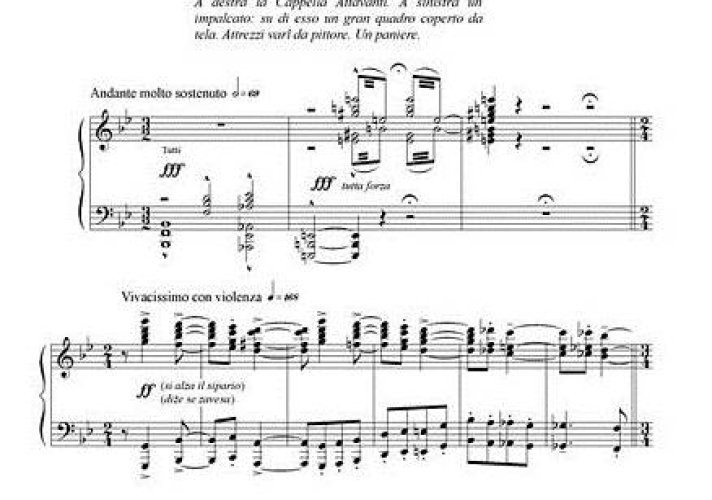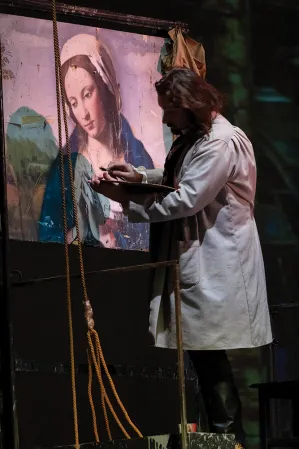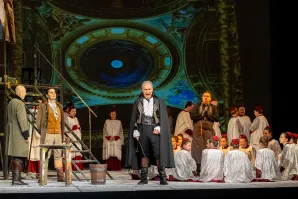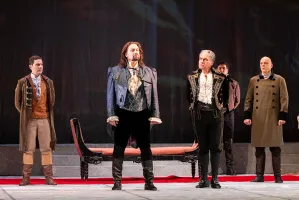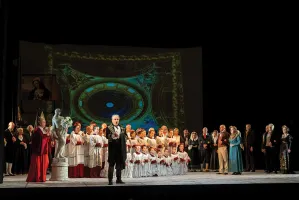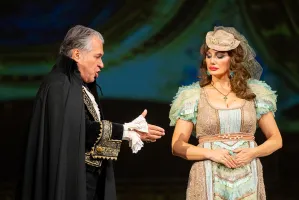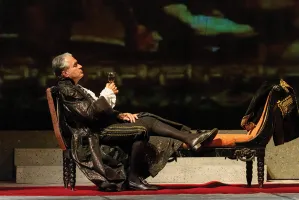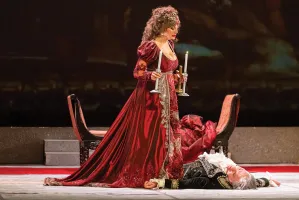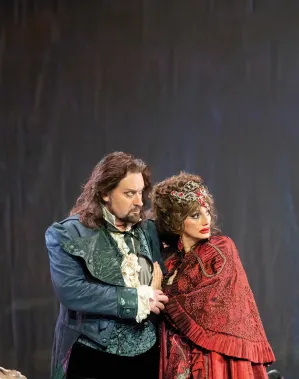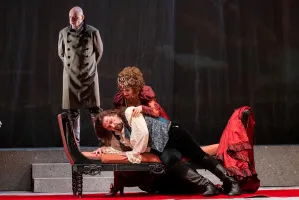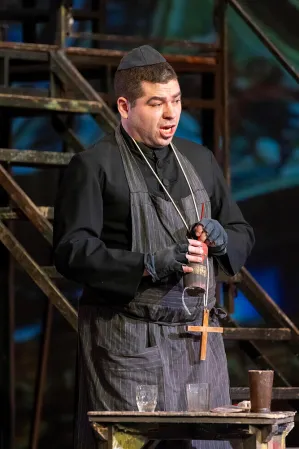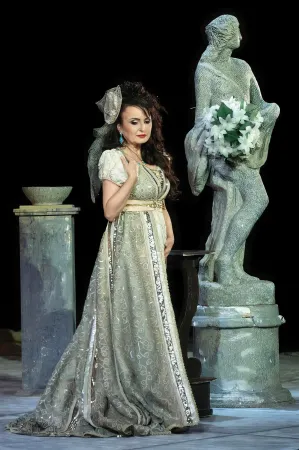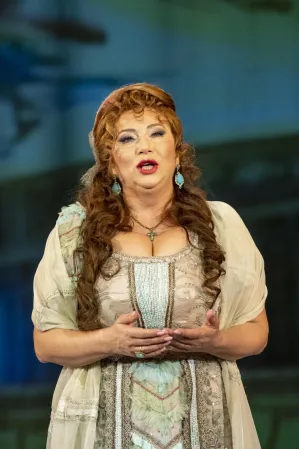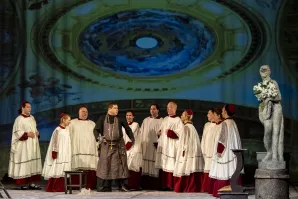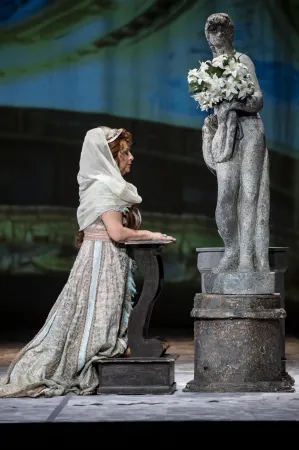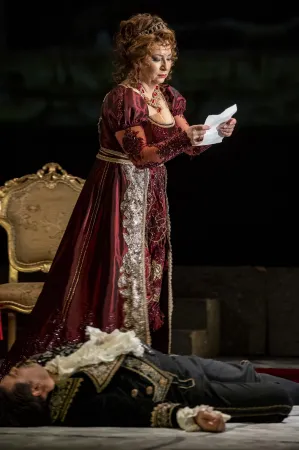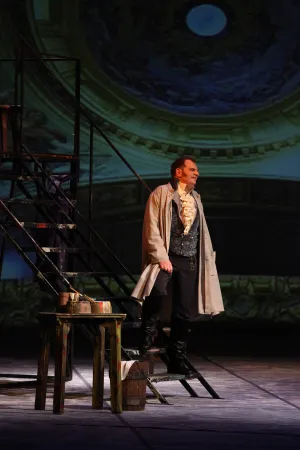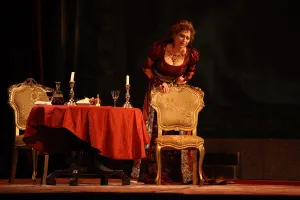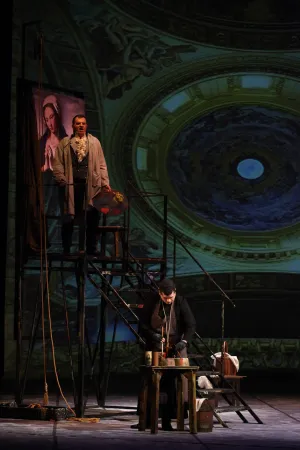Tosca
opera by Giacomo Puccini
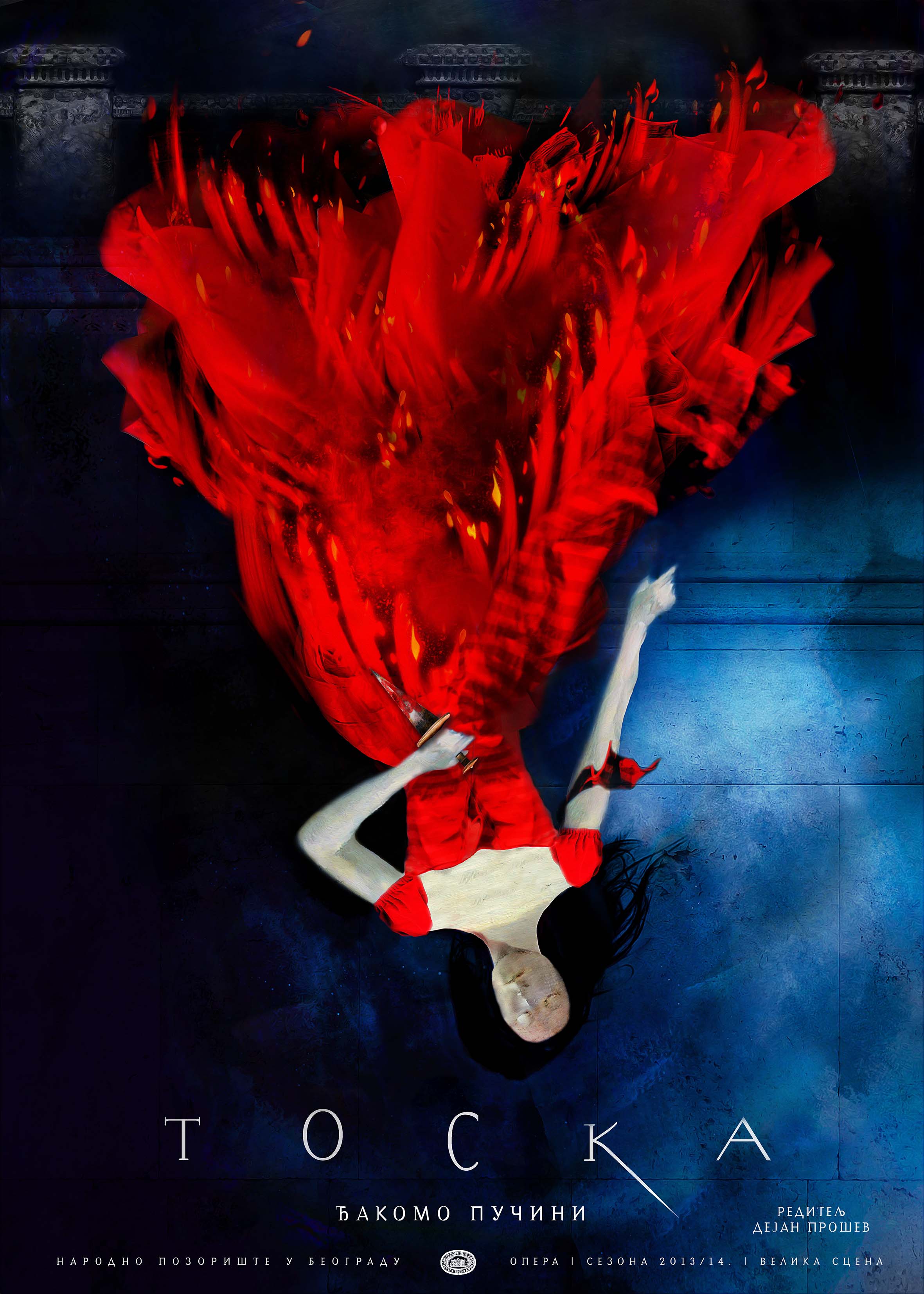
Act One - Basilica of Sant' Andrea della Valle
Cesare Angelotti, the former consul of the Roman Republic escapes from prison and arrives in church where his sister, Marchesa Attavanti, hid some clothes in the chapel for his escape.
The young painter Mario Cavaradossi comes to the church to continue his work on his painting of Mary Magdalene, whose face resembles Marchesa Attavanti. Captivated, he looks at the picture of his lover Floria Tosca in the medallion and compares her beauty to the beauty of Marchesa Attavanti (Cavaradossi’s Aria).
Angelotti is heard from the chapel and the painter wants to help him escape.
The arrival of Tosca interrupts their conversation and Angelotti retreats to the chapel. Mario is confused, and Tosca, overhearing the conversation, suspects that another woman is involved. Mario reassures jealous Tosca of his fidelity and she leaves (duet). A cannon from the fortress announces Angelotti's escape and Mario takes him to his villa to hide him. The infamous police chief Scarpia comes to the church with his men in pursuit of Angelotti.
Scarpia suspects that Cavaradossi helped him escape. Tosca returns to the church to tell Cavaradossi that they can't see each other that evening, because she is to sing a cantata before the queen. Scarpia approaches her and shows her the fan of Marchesa Attavanti, who was found in the chapel, and deliberately arouses Tosca’s jealousy, who leaves in tears, suspecting that Mario is untrue to her.
The people gather in the church for Te Deum, and Scarpia dreams that Tosca will be his (Scarpia's Aria).
Act Two – Farnese Palace
Scarpia has dinner in his office and sends a message to Tosca that he will be waiting for her after the cantata. Spoletta arrives to report that they followed Tosca to the villa, that she left the villa alone, and that Cavaradossi was arrested because he behaved insolently and suspiciously in front of them. They bring in Cavaradossi, who denies all allegations. Scarpia orders that they torture them until he confesses. Tosca enters and asks Scarpia to release Mario.
Screams are heard and Tosca admits that Angelotti is hiding in the well of the villa. At that moment, Sciarrone informs Scarpia that Napoleon defeated them at Marengo. Mario celebrates the victory over tyranny and, despite desperate Tosca, he is taken to prison, where he is to be executed the next day.
Tosca begs for mercy (Tosca's Aria).
Spoletta informs Scarpia that Angelotti killed himself in the well, before they managed to arrest him. Scarpia offers Tosca to be his lover that night, and in return she and Mario will get safe-conduct to leave the country the next day. Tosca agrees. Scarpia orders Spoletta in front of Tosca to arrange a mock execution of Mario the next day, as they did with Count Palmieri (who was actually shot). Tosca will attend the execution. She uses the opportunity when Scarpia pays no attention to her for a second, and not wanting to give herself to him, she takes a knife from the table and as he gives her the safe-conduct, she kills him. She puts candles and a crucifix next to his body and bitterly says: "And before him whole Rome trembled."
Act Three - The terrace of the Castel Sant'Angelo
It is morning. The bells are ringing and joyful song of the shepherds can be heard from afar. The dungeon keeper arrives to the terrace with Cavaradossi. A few hours before his execution, Mario writes a farewell letter (Cavaradossi's Aria). Tosca arrives and tells him the good news: it will be a mock execution, after which both of them will be free. The soldiers are coming. Tosca says goodbye to Mario. The soldiers open fire and Cavaradossi falls. Tosca approaches him and reveals that she has been deceived. Mario is dead. The murder of Scarpia is revealed. Soldiers are coming to arrest Tosca. In despair, she throws herself from the fortress.
Premiere performance
Premiere April 2, 2014
Main stage
Giacomo Puccini
TOSCA
Opera in three acts
Libretto by L. Illica and G. Giacosa after Victorien Sardou's play
Conductor Ana Zorana Brajović
Director Dejan Prošev
Set Designer Miraš Vuksanović
Costume Designer Katarina Grčić Nikolić
Premiere Cast:
Tosca Jasmina Trumbetaš Petrović / Suzana Šuvaković Savić / Ana Rupčić
Cavaradossi Dušan Plazinić / Janko Sinadinović / Dejan Maksimović
Scarpia Boris Trajanov, k.g. / Miodrag D. Jovanović / Aleksandar Stamatović
A Sacristan Pavle Žarkov / Mihailo Šljivić
Spoletta Darko Đorđević / Danilo Stošić / Igor Matvejev
Angelotti Vuk Matić / Aleksandar Pantelić / Strahinja Đokić* / Mihailo Šljivić
Sciarrone Mihailo Šljivić / Aleksandar Pantelić / Pavle Žarkov
A Shepherd Ivanka Raković Krstonošić / Jovana Čurović* / Jovana Belić*
A Jailer Strahinja Đokić* / Mihailo Šljivić
Cardinal, Judge Roberti, notary, army officer, sergeant, soldiers, spies, noblemen and women, people in church
The action of the opera takes place in Rome, June 1800.
Orchestra and Choir of the National Theatre's Opera
*Members of "Borislav Popović" Opera Studio of the National Theatre in Belgrade
Assistant Conductor Đorđe Stanković
Assistant Director Ana Grigorović
Assistant Set Designer Jasna Saramandić
Assistant Costume Designer Ružica Ristić
Video Production Petar Antonović
Concertmasters Edit Makedonska, Vesna Jansens
Chorus Master Đorđe Stanković
Music Associates Srđan Jaraković, Gleb Gorbunov, Nada Matijević, Nevena Živković, Stefan Zekić
Stage Music Đorđe Stanković, Milica Radivojević
Stage Managers Branislava Pljaskić, Ana Milićević
Prompters Silvija Pec, Biljana Manojlović
Producers Maša Milanović Minić, Snježana Vujasinović Đorđević, Nemanja Stanojević
Make-Up Dragoljub Jeremić
LIght Operator Srđan Mićević
Set Crew Chief Zoran Mirić
Sound Operator Perica Ćurković
Set and Costumes were made in the National Theatre's workchops

